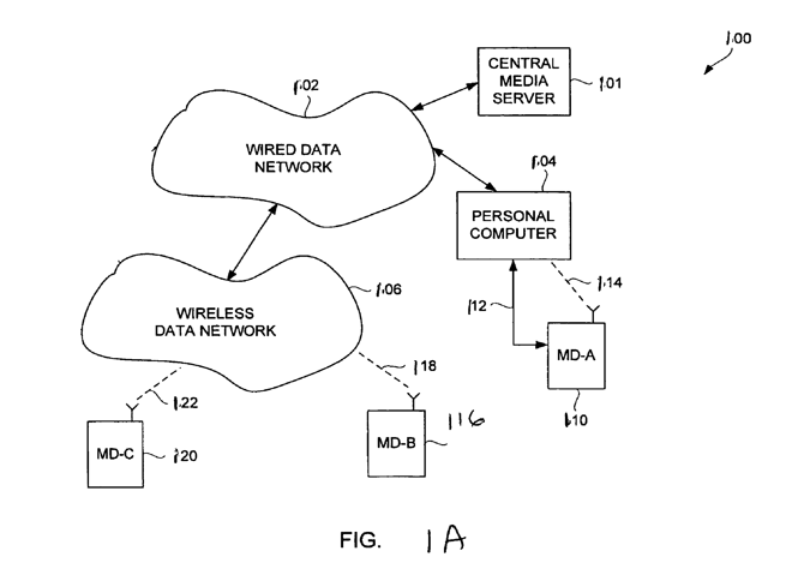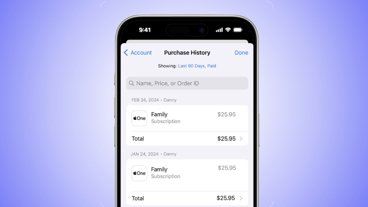New software would let iPhones access iTunes libraries from anywhere
A new version of Apple's iPhone Software could provide iPhone and iPod touch users with access to their home computer's entire iTunes media library while on the go without having to first download those media items through a traditional sync, a new company filing has revealed.
New versions iTunes and the iPhone Software could theoretically eliminate this problem by syncing only the metadata — or tiny files containing the barebones attributes of each media item or playlist but not the content itself — from a user's iTunes library to their portable devices.
Using this metadata, iPhones and iPods would contain "virtual media items" representing every playlist, video, photo, and mobile game stored on their computer, even if the sum of those files would ordinarily be too large to fit onto the devices' hard disk drive or flash drive. This is possible because metadata capable of representing a media item consumes only faction — typically less than 1 percent — of the space required to store the media item itself.
"As a result, the user perceives that the virtual media items may be available on the [the media player]," Apple said. "In this manner, the virtual capacity of an electronic device may be increased."
Users would select virtual media items for display or playback on their handhelds just as they would today under the assumption that the entire contents of the file sit on the device for immediate playback. But instead of accessing the files from the device's built-in storage, the iPhone or iPod would use a wired, Wi-Fi, or cellular connection to remotely access and retrieve the media items from a user's home Mac or PC.
"For instance, a personal computer can be turned on and connected to the Internet to enable a portable device to access the media items stored on the personal computer," Apple said, adding that the files could then delete themselves from the portable device once the user is done listening to or viewing them.
Through similar techniques, users could also manage their iTunes libraries remotely, reorganizing, deleting, or adding files while on the go. During all of these processes, the condition of the handheld's connection to a host source would be under constant surveillance to detect problems or a fading signal, at which time data transfer could be safely paused or stopped.
Alternatively, iPods and iPhones could communicate with one another in a manner similar to that employed by Microsoft's Zune media players.
"This type of communication can be referred to as peer-to-peer interaction. In this regard, one mobile device can communicate directly with another mobile device" or " to a plurality of other mobile devices," Apple said. "In the peer-to-peer environment, one mobile device can communicate with one or more other electronic devices (whether mobile or stationary) in the immediate vicinity. Data sharing can be performed when such communication is available."
The 24-page filing with the United States Patent and Trademark Office is credited to Apple employees David Heller and Thomas Mavrakakis.
 Katie Marsal
Katie Marsal














 Amber Neely
Amber Neely
 Thomas Sibilly
Thomas Sibilly
 AppleInsider Staff
AppleInsider Staff
 William Gallagher
William Gallagher
 Malcolm Owen
Malcolm Owen
 Christine McKee
Christine McKee










33 Comments
I'd definitely pay for this. Even better if it's part of MobileMe.
I've been predicting this for more than a year. Think of it as a portable Apple TV.
Yeah right, I'm sure this would really fly with AT&T.
If it does happen, they would probably restrict it for use on a WiFi connection, just like the Music store.
I've been predicting this for more than a year. Think of it as a portable Apple TV.
I have been doing the poor man's version of this for a while, by placing MP3s in my gmail account, and accessing them via the mobile browser...
not very efficient, my method
In a wifi context this is pretty cool. It strikes me that this would be a great way to burn up your monthly data allowance in a day or two, however, if you are using the GSM network! It also means keeping your computer at home on all day which I don't like the idea of. Maybe all this content should be stored in the cloud using mobileMe, as someone suggested. In terms of music, come to think of it, most content is already out there. So if you have the metadata, including digital proof you have paid for the content, couldn't it be streamed from anywhere? Theoretically speaking of course.